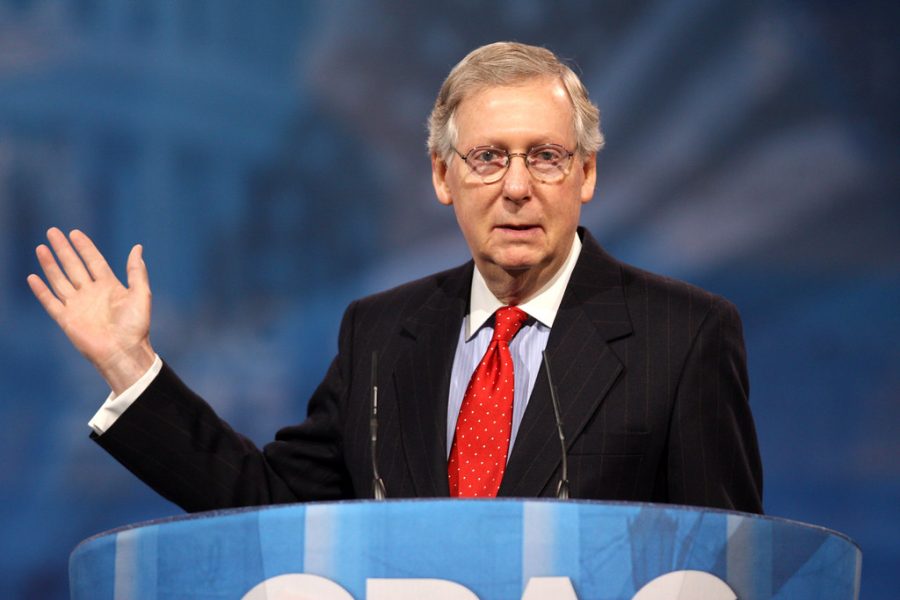Senate Republicans’ hypocrisy is at an all time high
Examining the legacy of the “Biden Rule” and its application to the death of Justice Ruth Bader Ginsburg
October 7, 2020
On Feb. 13, 2016, U.S. Supreme Court Justice Antonin Scalia died, leaving a complex yet compelling situation: the need for a bipartisan effort to confirm the next justice. With President Obama still in office and Republicans controlling the Senate, Obama would have to nominate a “centrist” judge in order to satisfy liberals and conservatives. In March of 2016, Obama nominated American lawyer Merrick Garland as the next Supreme Court Justice. His nomination would become the subject of a future political debate.
Republican Senate Majority Leader Mitch McConnell denied taking up Garland’s nomination, citing the so-called “Biden Rule,” which states that a president should abstain from nominating a Supreme Court Justice in the final year of their presidency.
McConnell referenced a speech that former Vice President Joe Biden made in June 1992, when Biden encouraged the Senate president “to urge delay if a vacancy did appear,” meaning that a Supreme Court nomination should be delayed until after election day. Biden’s speech however, took place three months later in the election cycle than did Garland’s nomination, with no actual Supreme Court nomination proposed by Biden.
Nevertheless, McConnell blocked a vote to confirm Garland despite outrage from scholars and liberals. Scholars argued that there was no previous precedent and, “In fact, over the course of American history, there have been 24 instances in which presidents in the last year of a term have nominated individuals for the Supreme Court and the Senate confirmed 21 of these nominees.”
Garland’s nomination was never voted on, and its expiration led to President Donald Trump’s nomination of Neil Gorsuch, who was later confirmed as an Associate Justice of the Supreme Court.
The precedent that McConnell set in 2016 may now have potential for the Democrats in 2020. Following the death of Justice Ruth Bader Ginsberg on Sept. 18, 2020, Democrats were quick to point out the need for the “Biden Rule” to be honored as Ginsberg’s death occurred just a few months before election day –– much closer to election day than did Obama’s nomination of Garland. However, McConnell stated after Ginsberg’s death that, “Americans re-elected our majority in 2016 and expanded it in 2018 because we pledged to work with President Trump and support his agenda, particularly his outstanding appointments to the federal judiciary. Once again, we will keep our promise. President Trump’s nominee will receive a vote on the floor of the United States Senate.”
Replacing Ginsberg top priorities for both Democrats and Republicans alike. Confirming a more liberal justice would maintain the balance of power with four liberal leaning judges and five conservative judges. However, Chief Justice John Roberts has sided with liberals in at least two prominent cases including abortion and DACA over the past year. Replacing Ginsberg with a conservative or a founder’s intent, a justice that thinks the law should be interpreted how the founding fathers interpreted the law, could tip the balance of power, which may result in more conservative rulings regarding marriage inequality and reproductive rights, among other things.
McConnell’s failure to recognize a confounding rule that he himself popularized is a perfect display of hypocrisy. The simple fact of the matter is that creating a rule just to amend it when it’s not in your favor is hypocritical and reflects a desperate grab for power.
McConnell’s defense is simply illegitimate. Rules cannot be changed at the drop of a hat. They must be revised through a process that the majority believes in. Back in 2016, McConnell failed to mention the “second part” of his rule. Admittedly, most rules do change over long periods of time as perspectives change. However, rules and precedent do not change overnight.
Local community members need to avoid these same antics and value precedent while also pushing the voters’ agenda. Governments should not have to write every single rule, but rather uphold traditions and unwritten rules. While McConnell is technically following the rules, the Senate does not write every rule and precedent to follow. The Senate and government in general does not just follow rules, they follow precedent to those rules.
It’s comparable to everyday life. While using profanity is not illegal in any general setting, public pressure and precedent tell us that it is unacceptable to the general public, despite it being legal. McConnell should not rely on the fact that the rule says he can do something, when in reality, it is now not widely accepted as something that should be done.
What should be the overarching worry for Americans is the abuse of the majority. Americans should be concerned that the majority, whether Democrat or Republican, changes rules to be politically advantageous. Government is meant to be stable as time passes. The current situation of polarization and Supreme Court nominations emphasizes the need for unity and acceptance of unwritten rules.




























